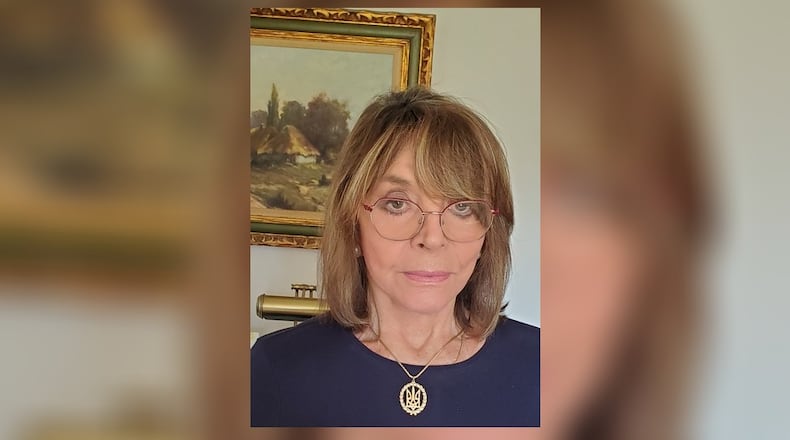My niece, Julia, is now in Ukraine, back from Switzerland where she and her friend Natasha, with her little boy, Kyrill, were refugees. They were living with an American family, Dacia and Luke Snider, who are my daughter Ariana’s college friends.
At the onset of the war, knowing that Ariana had relatives in Ukraine, they offered their home to both women, the child and even Oscar, their cat. This was generosity — no questions asked, no worries about possible complications or the length of stay.
When I raised doubts about the convenience of housing the trio sight unseen, Dacia responded without hesitation: ”Let them all come! Just tell us how we can make their stay comfortable.” Julia vacillated: ”If I go, if I leave Ukraine, I’ll never come back.”
Still, on March 12, with my encouragement, Julia and her passengers undertook the dangerous drive across most of Ukraine and half of Europe — 1,774 miles — arriving at their hosts’ doorstep 11 days later. They were greeted with open arms like long lost friends.
Julia and I Skyped several times a week during her seven-month stay in Switzerland. Her hosts accepted both women like family. They lodged in the downstairs area where the Sniders had a combination gym/family room and were given beds, a microwave, and, one week after their arrival, a piano. Julia, an accomplished pianist by profession, called me jubilantly when she saw the new acquisition and screamed “It’s a miracle!” She now could give lessons to supplement the monthly stipend of 300 euros she was getting from the Swiss government.
Dacia enthusiastically chauffeured the women to various government agencies to formalize their status and found refugee assistance centers to help with the transition. The boy was enrolled in a kindergarten, Dacia found two students for Julia, and even arranged for French lessons for both women, free of charge.
Aside from helping with the necessary bureaucratic concerns, the Sniders included them in all parties, outings, trips to restaurants and so forth. And they were delighted with Julia’s and Natasha’s Ukrainian cooking.
In May, Julia was invited to perform at a benefit concert for Ukrainian refugees. She was thrilled — her talent would be recognized, she might get other offers… she could become famous!
Unfortunately, none of what she expected happened, and she gradually became disenchanted and unhappy. Now safe and out of danger, both she and Natasha were forced to face the reality — their arrangement was temporary. Natasha, a physician, had no possibility of practicing medicine. Julia wouldn’t find a teaching position in a school because the Swiss hired only their own. Learning French was difficult. It was only a matter of time before the Sniders would tire of them.
At the end of October, after months of indecision, Julia announced that they were all leaving, driving back, into winter and into the war zone. No amount of my convincing her otherwise made a difference.
I finally spoke to Julia this week, though she’s been back since mid-November. Communication has been spotty. Ukrainians are asked to conserve electricity when it’s available. Last Sunday I got an email from her, eerily reminiscent of the ones she sent at the beginning of the war: ”Good day, I hope you are fine. Power has been restored (until the next bombings). If it is convenient for you, and we have electricity, we can Skype on Tuesday around 12:00.″ She sounded and looked fine, a bit tired.
Kharkiv, like other cities, is striving for a semblance of normalcy. Food stores are open as well as pharmacies and hospitals. Natasha went back to work two days after getting back. There are no Russian soldiers on the streets, but gruesome reminders of the destruction is everywhere, such as the periodic sirens warning people of missile attacks.
When I asked if she was sorry to have gone to Switzerland, to have come back, when I hinted at the absurdity of these two trips, she was vague. I wonder if she herself knows why she went back to square one. This was not her only choice. A friend of hers, also a musician, found a teaching job in Austria.
At the moment, she stays home giving lessons over the internet and to a few local students who come to her house. The music school where she worked is closed. The future is uncertain, but one thing she knows: She won’t stay in Ukraine. She wants to come to the United States.
Editor’s Note: Tatiana’s cousin Victoria, her daughter Lena and her six-year-old twins had a very different journey. Read more in this coming Sunday’s Ideas & Voices.
Tatiana Liaugminas was born after WWII to Ukrainian parents, refugees from the former Soviet Union. She’s an American citizen, with relatives in Ukraine. She teaches Russian at the University of Dayton.
About the Author

